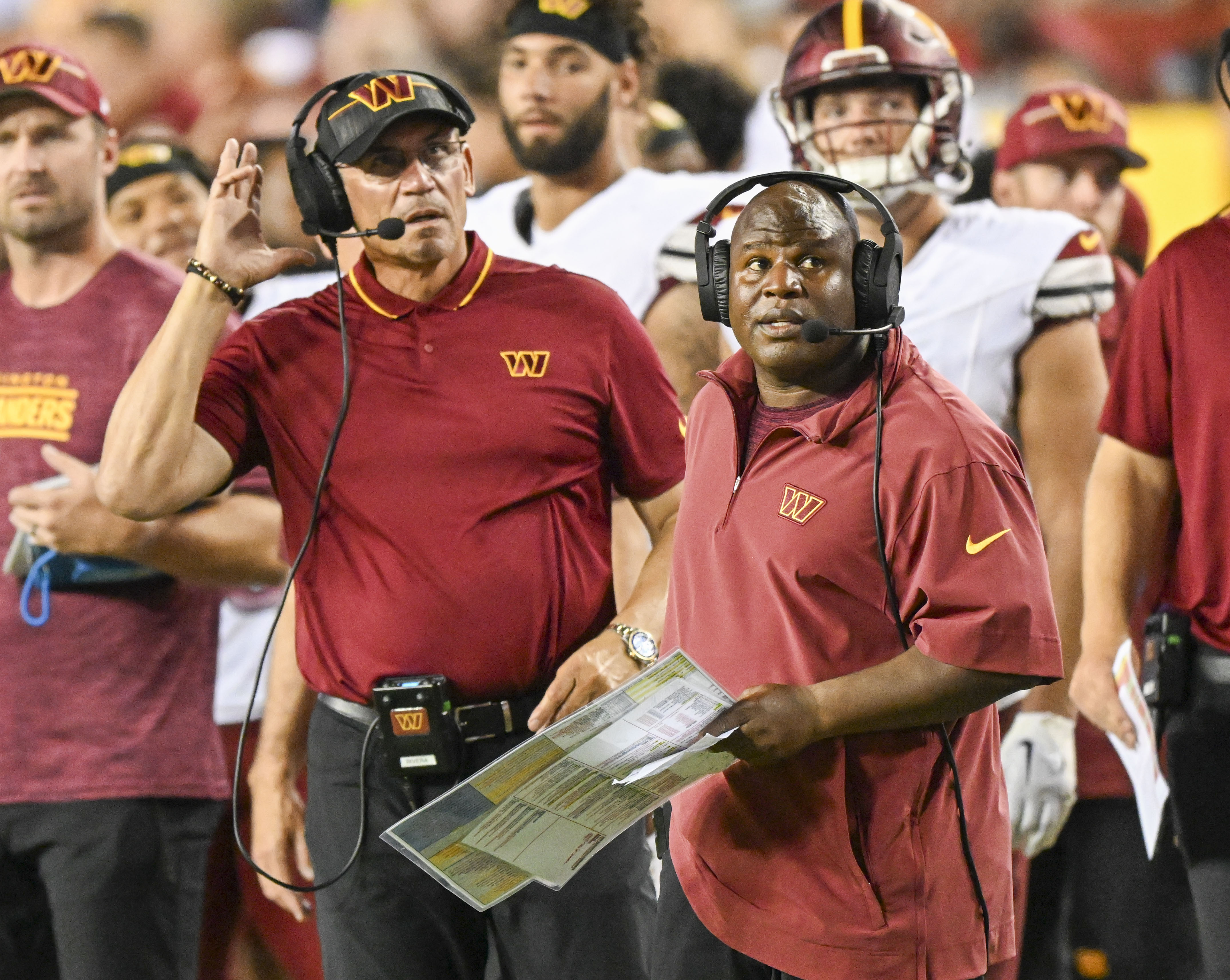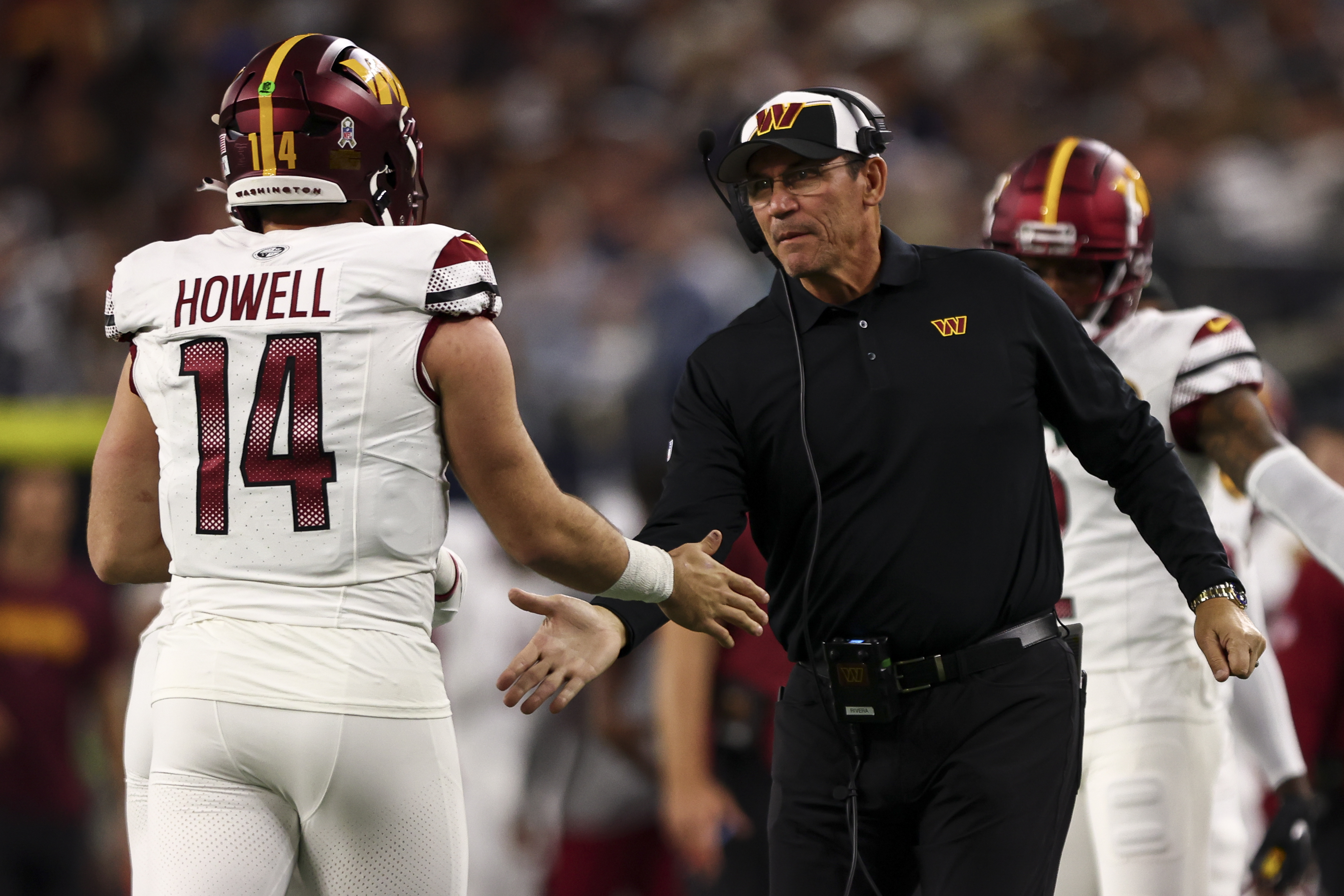Tied for last in the NFC East with a record of 4-8 and losers of three in a row, the Washington Commanders are experiencing yet another disappointing season under coach Ron Rivera.
With them, it figures to be Rivera’s last.
In his fourth full season both as the franchise’s on-field leader and its final authority on all football operations, Rivera has a record of 26-35-1. During his tenure, the Commanders have never had a winning record. With one more loss in its final five games this season, the team would finish under .500 for the third time with Rivera at the helm.
Then there’s Rivera’s poor performance as Washington’s football CEO.
He has been equally ineffective at running the Commanders’ front office, with his flawed leadership resulting in major misses in the draft, free agency and the trade market. For example, Rivera, a former NFL linebacker and longtime defensive assistant before becoming a head coach, instructed his underlings to focus on defense in the draft.
Yet despite having used six first-round draft picks on defensive players at Rivera’s direction, the Commanders’ defense ranks last in the league in total yards, passing yards and points per game at 29.2. After a blowout loss to Dallas Cowboys on Thanksgiving, the Commanders fired defensive coordinator Jack Del Rio.
Throughout the league, it is believed that new Washington club owner Josh Harris will relieve Rivera of his coaching and executive duties after the season, if not sooner, with one year remaining on Rivera’s five-year contract. Fact is, there’s no credible argument for Rivera to remain in such a powerful position with the organization.
Still, on many levels, Rivera’s likely impeding ouster is bad news for the NFL’s coaches of color.

Jonathan Newton/The Washington Post via Getty Images
In the 32-team league, Rivera, who is Latino, is one of only six coaches of color. The NFL, whose player workforce is overwhelmingly Black, has only three African American head coaches.
With leaders of color underrepresented at the top rungs of the coaching ladder, any dip in their numbers is discouraging for a group that continues to be marginalized in pro sports’ most successful and powerful league. And the fact that Rivera didn’t cut it as a roster architect also figures to result in less diversity in the C-suites at the club level, which is an area of concern for the NFL’s proponents of diversity, equity and inclusion.
For some coaches of color, however, the most troubling aspect of Rivera’s situation in Washington is that his performance, they believe, could have a negative effect on future hiring at the club level.
In interviews over many years with Andscape about the NFL’s hiring practices, many coaches and front-office employees of color have expressed their opinion that when white coaches and executives fail, they are viewed as individuals. Their performances only reflect poorly on them, which, of course, is only fair. In other words, Los Angeles Rams coach Sean McVay and San Francisco 49ers coach Kyle Shanahan never have to worry about being lumped in with former New York Giants coach Joe Judge and former Denver Broncos coach Nathaniel Hackett.
But the aforementioned NFL employees of color believe that they are viewed monolithically, so that any failure within the group taints all employees of color in the eyes of the people who control the NFL: team owners.
N. Jeremi Duru understands their thinking.
A professor of sports law at American University, Duru authored the definitive book on the creation of the Rooney Rule, Advancing The Ball: Race, Reformation, and the Quest for Equal Coaching Opportunity in the NFL. Among the nation’s foremost experts on the NFL’s hiring practices, Duru said there is precedent for concern.
“Historically, in all different walks of life in this country, it been the case that people of color have been viewed monolithically,” Duru said in a phone interview this week. “Consequently, if you have one person who fails to rise to a certain standard or surmount a certain bar, presumptions are developed that, well, nobody of that group — people of color, Black people — are gonna be able to do that. That definitely is a dynamic. And it’s not just in sport. It’s throughout society.”
Simply put, on being hired by then-Washington club owner Daniel Snyder in January 2020, Rivera became the NFL’s most powerful minority head coach in a generation.

Kevin Sabitus/Getty Images
He had more power than any NFL head coach of color since Tom Flores, who led the Seattle Seahawks for six seasons beginning in 1989, first as club president and general manager and then as the team’s coach. Just as Flores was once at the center of power in Seattle, everything in Washington’s facility has revolved around Rivera, who led the Carolina Panthers to Super Bowl 50 and was chosen as the Associated Press NFL Coach of the Year (2013 and 2015) twice.
If Rivera had succeeded as Washington’s omnipotent leader, he could have spurred a transformative shift in inclusive hiring for a league still struggling on that front despite its ongoing efforts to improve. The NFL is a copycat league in which team owners follow their competitors’ successful blueprints.
But Rivera had no history of being the primary architect of an NFL roster, and he has shown – repeatedly – he’s not suited for it. Coach Rivera couldn’t overcome executive Rivera’s blunders, and the Commanders suffered from having one person performing poorly in an organization’s two most important football positions.
Moreover, early in his tenure, Rivera got out over his skis in the role of being the face of Washington’s franchise.
Snyder, whose name is on the short list of the worst team owners in the recorded history of sports on earth, needed Rivera to be the Commanders’ front man because of Snyder’s toxic relationship with Washington’s fan base. Rivera is paid spectacularly, so, well, he obliged.
Before he had even coached a game, Rivera was pushed out front amid the whirlwind of activity to rename the franchise (the former name was long condemned as being an anti-Indigenous slur). Rivera filled the leadership void during the fallout from reports detailing allegations of rampant sexual harassment in the organization, which painted a horrific picture of Washington’s corporate culture during Snyder’s tenure as team owner.
In fairness to Rivera, Duru said, any review of his performance in Washington must at least mention that Rivera had to wear hats most football coaches wouldn’t be comfortable in.
“It’s hard to imagine having success, on any level really, in the organization throughout all of that,” Duru said. “But regardless, it’s inappropriate to extrapolate from one individual’s experience and apply it more generally to an entire group of people, racially or otherwise.
“The situation in Washington should be viewed as anomalous. It was such an anomalous, aberrant organizational culture there that [Rivera’s performance] shouldn’t be held against [other coaches of color].”
In theory, absolutely. History, however, tells a different story. Shortly, the curtain is expected to come down on Rivera’s long-running show in Washington. And once he walks off the stage, it’s unlikely another coach of color will be cast in such a prominent role anytime soon, if ever.




New Comments